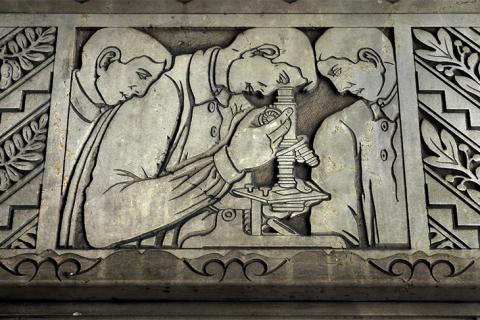Naval ROTC midshipmen stand at attention as Captain Chris Harbiston examines their formation during a squad drill competition on Thursday morning (March 31) on the Tulane University uptown campus.
In the mid-1800s, the United States was not on the forefront of scientific innovation — Europe dominated the field. That makes it all the more fascinating that two of the most groundbreaking scientific inventions in microscopy occurred in the United States at Tulane University, says alumnus Lary Walker.
Walker discovered that researchers John Leonard Riddell and John (J.) Lawrence Smith, both of whom were professors of chemistry at the University of Louisiana (now Tulane University), had made two major contributions in the field of microscopy.
In 1850, while he was teaching at Tulane, Smith invented the inverted microscope. Riddell, a professor from 1836–1865, invented the first practical microscope to enable binocular viewing of objects through a single objective lens.
“One of the most powerful motivators for students is the desire to live up to what has happened in the past,” says Walker, who received a master’s degree and a PhD in psychology from Tulane in 1976 and 1979.
Inspired by the work of Riddell and Smith, he decided to make a gift to the School of Science and Engineering in the hope that he will motivate students to create and innovate like the great people that came before them at Tulane. His generosity will reward one student project created in the Maker Space with an annual honor of “Maker of the Year.”
Slated to open in the fall, the Maker Space will serve as a visionary center for design, invention, innovation, ideation and fabrication on the Tulane uptown campus. Students from the entire university will have the opportunity to use this space to transform classroom ideas to real-world products.
“Students can only learn so much in the classroom,” he says. “Ultimately, what we learn is up to us. Inspiration is what propels people to take up education as a personal journey rather than something that only happens in the classroom.”
Allison Hjortsberg is a communications specialist in the Office of Development Communications.

